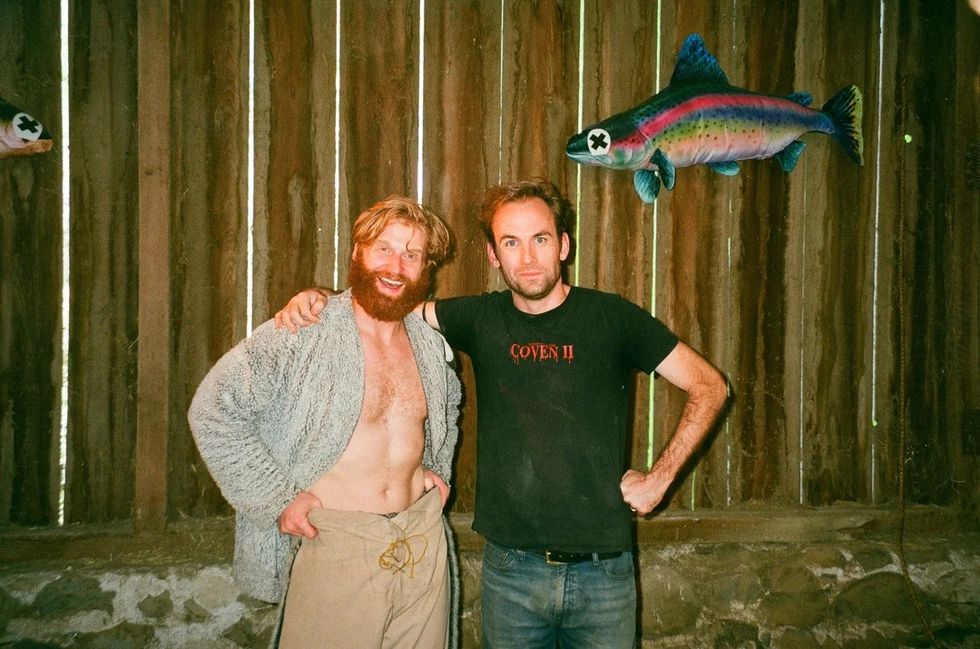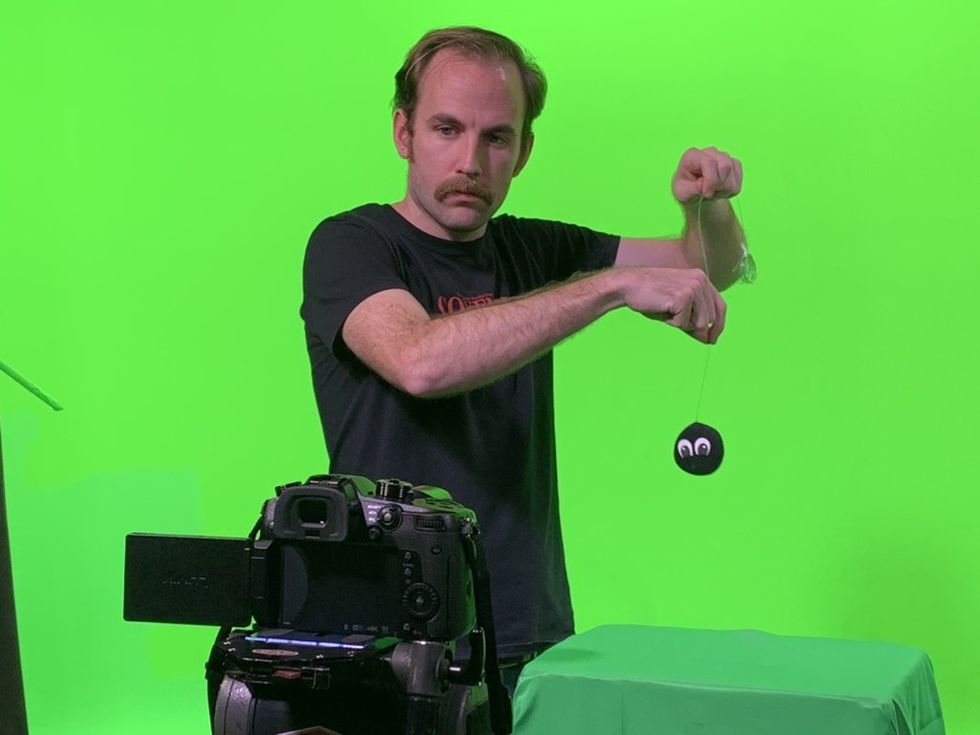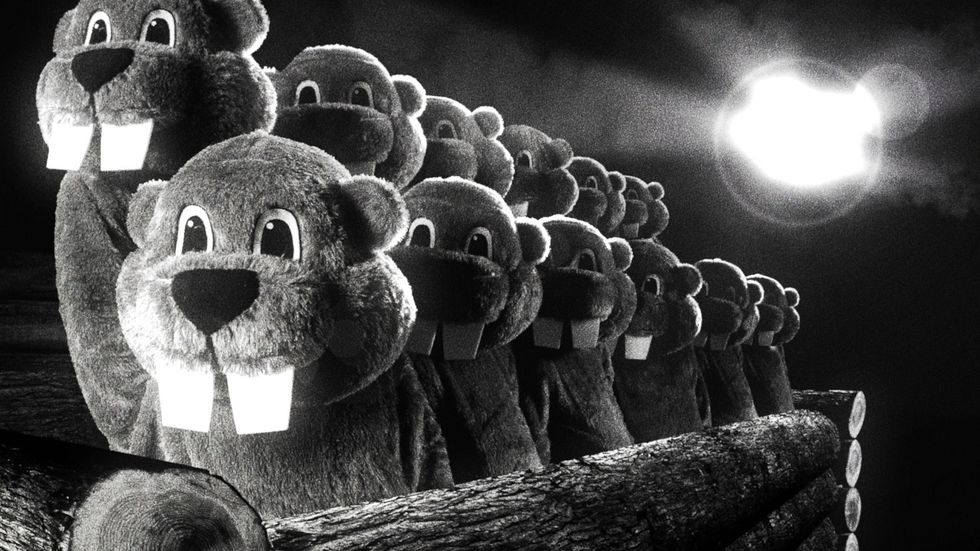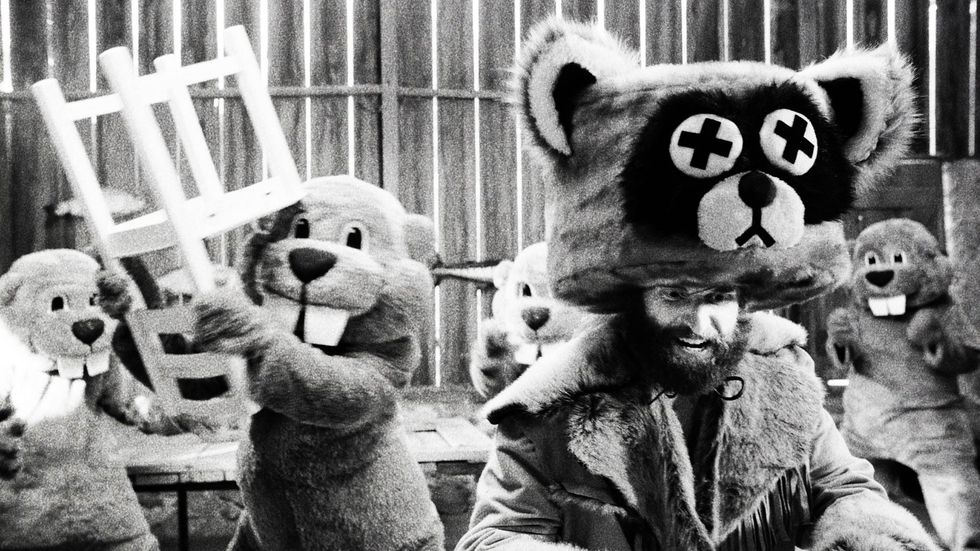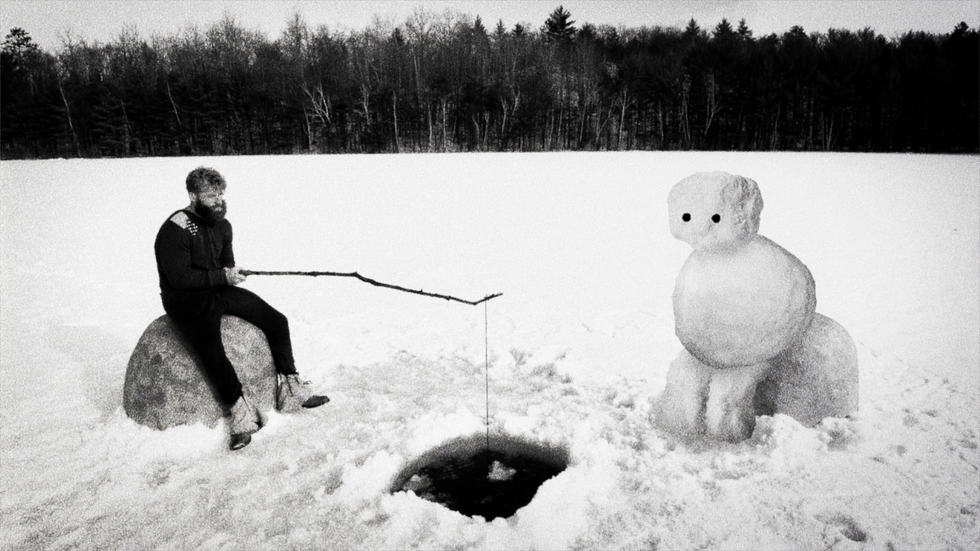'Who is Arthur Chu?' Filmmakers Bring a Viral Online World to the Big Screen
Winning Jeopardy! eleven times made Arthur Chu a target for internet trolls, so he decided to talk back. His story is now a Slamdance film that he has yet to watch.
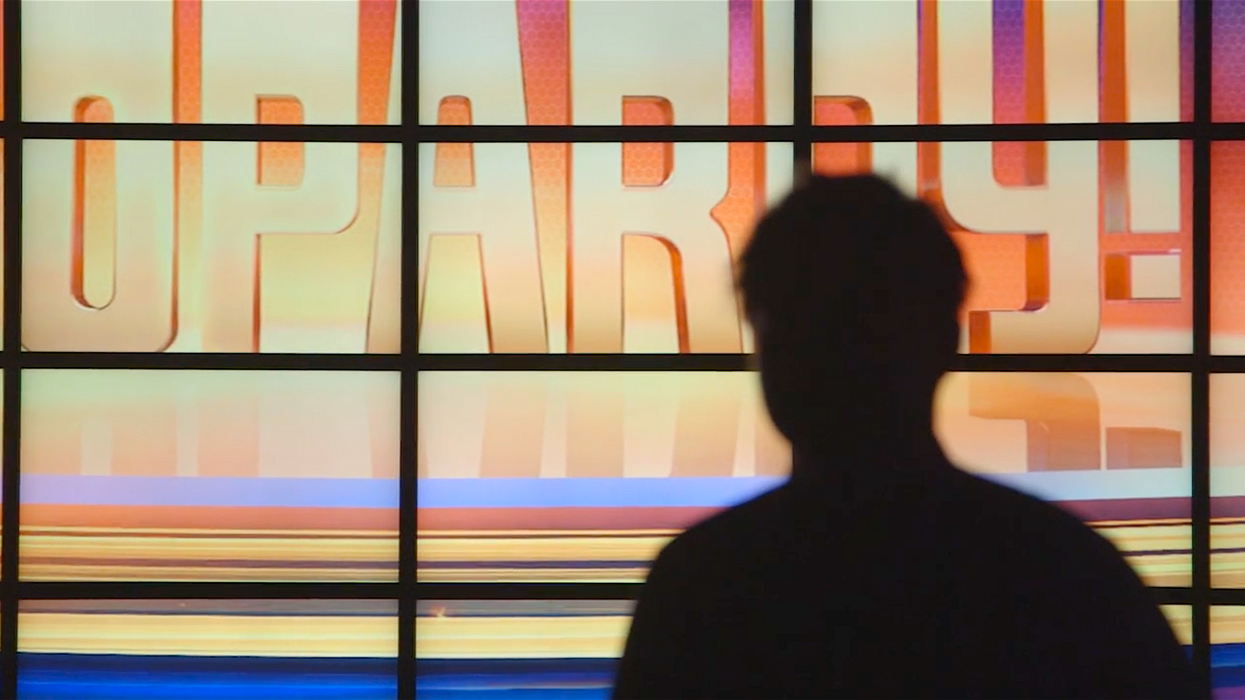
Arthur Chu first made waves as an 11-time champion of the game show Jeopardy!, playing the game in an unorthodox way of jumping around the board instead of proceeding through the categories in an orderly fashion. Chu wasn't the first person to play Jeopardy! this way, but he received a ton of backlash from ardent fans of the show for his playing style, including racial slurs.
Chu engaged with this Internet audience, not apologizing for his strategy, and at times, stoking the flames. Then, Chu decided to parlay his 15 minutes of fame into writing essays on current events from his perspective as an Asian American, with a particular focus on how men ensconced in the internet culture discuss women online in derogatory terms.
Chu has received both praise and criticism for his essays and social media exchanges, and sometimes he can't control himself when he feels the need to respond to the online trolls. Documentary filmmakers Scott Drucker and Yu Gu began to follow Arthur to figure out Who is Arthur Chu?, and their film of that name recently premiered at Slamdance 2017.
Check out the trailer below and continue on to read our interview with the filmmakers about what drew them to tell Arthur's story, how they worked through challenges in post-production to shape the film's narrative, and whether or not even Arthur Chu knows the answer to the documentary's title.
NFS: What specifically made you both want to tell the story of Arthur Chu?
Scott Drucker: It was watching Arthur's appearance on Jeopardy!, and as he was going viral, he was getting a lot of attention. I was drawn to the backlash itself and not just the way Arthur played the game or the controversy. It was just kind of the way we set up the film with those unfiltered tweets coming in. That's what really drew me to the story and then also wanting to know more about Arthur.
We knew there was a lot more to the story than just this controversial guy who had his 15 minutes of fame. Jeopardy! is just a framing device.
"The first hook for me was Arthur's writing and realizing that there was more to him than just this game show."
Yu Gu: The first hook for me was Arthur's writing and realizing that there was more to him than just this game show. His journey really connects with me personally because I am also an immigrant. My family is Chinese. English is my second language. I felt like an outsider most of the time growing up in Canada. All those things that he battled within his mind are things that I'm also very conflicted about. Arthur is trying to affect a positive change in this world.
A lot of young people these days feel like the world that has been given to you by the previous generations has so many things wrong with it. In many ways, people who are minorities or who are women or whoever are getting the short end of the stick. He is calling that out. That's something that I'm very passionate about, too.

NFS: I don't watch Jeopardy! on a regular basis, but I do remember thinking, "Wait a minute, isn't Arthur Chu that guy who won on Jeopardy! a lot but he was driving people crazy for some reason?" Then your film starts with this very quiet, thoughtful person on camera, and I quickly realized, "I have no idea who Arthur Chu is. " Can you talk about opening with that dichotomy of the public consciousness of Arthur on Jeopardy! and his online persona and who he really is when you talk to him personally?
Gu: That's the point of our film, to uncover the layers of this person. There is his persona in the public and his online presence, and beyond that, his own myth about himself and just how he is and how he acts on a day-to-day basis. It's all these different layers. We wanted to have that up front as well.
The opening was the hardest thing to edit. What we wanted to do was show this guy thrown into this online celebrity—a crazy, kind of surreal world—and contrast it with where he comes from, his status, his upbringing as an outsider, someone who is struggling with his identity. We show glimpses of those things, and then later on in the film, we unravel all of those things.
"Early on, you get a sense there is so much more to the story and there is so much more to this person."
Drucker: Pretty early on, Arthur's internet celebrity crossed over to the mainstream media. I think when that happens, there is an unquantifiable number of people who are immediately determining who somebody is based on the 20 minutes they see on television or like this one little clip that ABC News has.
Early on, you get a sense there is so much more to the story and there is so much more to this person. In a way, it's creating a little bit more empathy. I think that speaks to the universal idea of online trolling and cyberbullying, how that's something a lot of people face, and a lot of times we don't know. You think you're anonymous [online], but there is actually a real person [on the other side of that dialogue]. In fact, it is very much a real space.
NFS: When you started the process of following and interviewing Arthur, what did you notice about him that the internet and media coverage had missed up to that point?
Gu: I feel like everything! The media coverage and the internet is so one-dimensional. They keep harping on the same things. It's an echo chamber of the 24-hour news cycle, and then in terms of internet trolls, it's just focusing on one thing about him, like his race.
When you start observing someone, and not just in the sense of filming them for a documentary, not just as a friend or something, you notice all these different things, and you put together this puzzle of who this guy is through his experiences. I think learning about what he went through, the stories of his family, his time in college and with [his wife] Eliza, all the things that they went through as a couple. I think he is a guy who really means well, but he is almost not aware of his own tragic flaw in the sense of he gets too involved or too invested, and he can't control that part of himself.

NFS: How much do you think the experience of getting trolled online while he won Jeopardy! influenced who Arthur is now?
Gu: I think he likes to believe that he is the same person that he was before this all happened. I feel like it definitely affected him, and it changed the way his brain is set up in a sense. It’s kind of an addiction, having that platform, having that audience. Arthur definitely became addicted to it. In that sense, I think he definitely was affected by it, and he changed because of it. I think some of his values also started to change in terms of doing things just for attention rather than maybe for the pure intention of the action.
Drucker: I think the character transformation is definitely there with Arthur trying to stay in the limelight and maintain his 15 minutes of fame, now being a public speaker and cultural pundit. What he sacrificed to maintain that was his relationship with Eliza. Even his mother says it in the film, it’s just like he is losing a sense of what’s really important in the world.
Gu: Yeah. I think it's like becoming more self-involved because everyone is interested in you. Even the trolls are interested in him. He's like, "Everyone is focused on me," and then he's forced to be more focused on himself, too. Again, it’s like becoming more self-involved and more ignorant of the other people in your life—for example, Eliza.
NFS: I was really drawn into the story of Arthur’s wife, Eliza, and their relationship. Could you talk about how Eliza shaped the structure of your film?
Gu: Eliza is someone that we also had a lot of problems with in the editing process. At first, she was almost trying to overcompensate for Arthur and the fact that he would be so self-involved in studying for Jeopardy! that he didn’t even have time to talk to us. She was trying to fill the silence with her explaining everything that was going on.
Then toward the middle of the process, Eliza was really annoyed that we were filming her. She hated the attention, especially in public when we would film her. She would be really self-conscious. She withdrew from us in that sense, so we had less access to her.
"We were not afraid of making Arthur seem like a hypocrite."
Scott and I really both loved Eliza as a person. She is equally as fascinating as Arthur, but she was not as attention-hoarding, if that makes sense. In the editing process, it was a little bit difficult for us to craft [her story]. Also due to her illness, she is not able to be as active. She is just at home most of the time, and her energy is also really low, but we wanted to show her in a way that could still hold her own and show her as someone who has passions.
We were not afraid of making Arthur seem like a hypocrite. When you see the footage, it’s obvious that he is hypocritical. I think in some ways it’s not just him. I don’t know if that makes it better, but it’s very typical in the sense of why certain men understand what it means to theoretically talk about great relationships with women or gender equality, but in practice, don’t know how to handle that.
We live in a patriarchal society. It’s a normal thing, and it’s hard to break out of that in your own everyday life. It’s almost easier to talk about it theoretically in front of crowds. We were not trying to shy away from showing that at all.
Drucker: Probably one of the reasons why Arthur doesn’t really want to see the film just yet.
NFS: Arthur hasn't seen it yet?
Drucker: No. We just talked to him. I don’t think he is ready to see it because [Arthur and Eliza] separated and then divorced. Also, that crippling nostalgia that he must have for his past and his relationship with both his family and his heritage, he knows that we illustrate that in the film as well. I think that’s probably tough for him to look back on all that. He might come around, but as of now, he is choosing not to see the film.
NFS: Picking up on that thread, along the way during the documentary, Arthur has to reckon with his relationship with both his father and his mother. I was surprised by some of the things both of his parents revealed during their on-camera interviews, sometimes in front of Arthur himself. Did some of what his mother and father said actually catch you a bit off-guard during the filming of this story?
Gu: As a documentary filmmaker, you can only hope that your subject is genuine and open in front of you. There are tons of things that Arthur’s dad said when we were filming with him that were like, “Oh my God,” but he was obviously not aware that it was something that was negative necessarily.
For example, we were in Taiwan, Arthur’s family reunion, and Arthur’s dad was saying how Arthur’s cousins all had sons, and his aunt was super relieved because she was dying and the fact that they had sons means that their family name can continue because they didn’t have daughters. Also, his dad would just berate Arthur and treat him like he was two years old in front of the camera. All those things, I think it obviously just came naturally to him. Luckily, he felt okay with just being himself.

I think one thing that was surprising to me during that dinner scene with Arthur and his dad was he was being so helpful in a way that was really just like an advisor. I’m Chinese too, and when my dad talks to me, he always tells me, “You should do this. You should do that.”
In some ways, Arthur's dad was more like, “What do you want to do?” and asking him, “What would your ideal be?” Giving him this advice in a gentle way and even going to the extent of saying, “I think your grandfather would be really proud of you right now. He is looking down at us from heaven.” Things like that really moved me.
Arthur may have a lot of problems with his father, and his father may have treated him terribly at one point, but his father is still a human being who has a son and who loves his son in his own way.
NFS: What was your biggest challenge when making Who is Arthur Chu? What lessons did you learn from that challenge that you could pass along to other documentary filmmakers?
Drucker: You’ve got Twitter and Facebook and all the social media where a lot this story takes place. Considering that Arthur lived in this viral world, we had to figure out a way to [show this online space]. Visually putting that text on screen in a way that is visceral or just contextualizes this experience and where it takes place, that was one of our challenges. That’s something that unfolded in post-production.
I would say to think about that early because we tried to follow Arthur as much as we could. We tried to track him online, but it unfolds so quickly and things get lost in the abyss. You've got to stay on it and put that stuff down and make that part of the post-process, selecting from tweets, Facebook, etc.
Gu: One of our other challenges was deciding what type of film we wanted to make. I think we could have approached this film like a competition film because Jeopardy! is a very popular game show. We could have milked that angle a lot more. In the edit room, we actually had to cut away a lot of the Jeopardy! tournament of champions stuff that we had with Arthur because it wasn't really the film that we wanted to make. We wanted to make a film that was a complicated character study about this guy, one man against the world. We had to change it and move forward with that.
"Know who you are as a filmmaker and what type of film you are passionate about making."
I think advice for other filmmakers is to know who you are as a filmmaker and what type of film you are passionate about making. Make that film as best as you can to appeal to wide audiences and use the universal language of cinema. I think if you know the film that you want to make and you’re passionate about it and you are working hard to make sure that it translates to other people, you’re going to have a good film.
Drucker: I’m actually inspired! I’m ready to make our next project. That’s why we work together, it goes back and forth. I inspire Yu, Yu inspires me to make films.
NFS: I realize the title of your film is a play on Jeopardy! responses, but I have to say after watching your film, I can’t help wondering, do you think Arthur himself has figured out the answer to the question, "Who is Arthur Chu?"
Drucker: I would say going back to this idea that you can’t really put people in this box, I would say that no, it’s always a constant journey for Arthur. He is trying to figure out who he is. I think for me personally and I’m sure for a lot of filmmakers, we see a lot of parallels between Arthur and ourselves. It’s not like you’re always in existential crisis, but it’s just little identity pieces that you’re trying to figure out along the way. It’s a constantly changing experience.
Gu: It's kind of like what his mom is saying in the film, that Arthur needs to decide what his life is about. He needs to focus on his life. I don't think he has done that yet. Maybe that’s the next chapter of Arthur's journey.
Featured image: Still from 'Who is Arthur Chu?' Courtesy of the filmmakers.

